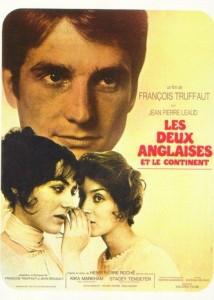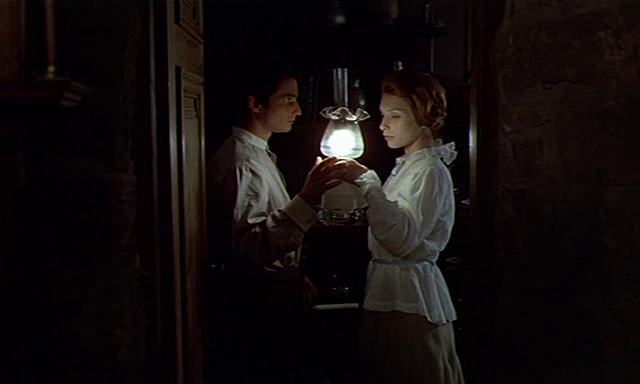|

Synopsis:
In the early 20th century, a young Frenchman (Jean-Pierre Leaud) befriends two English sisters — Ann (Kika Markham) and Muriel (Stacey Tendeter) — while living with them and their mother (Sylvia Marriott) in their countryside home. With encouragement from Ann, Claude (Leaud) falls in love with Muriel, but his mother (Marie Mansart) insists that they spend a year apart to verify their commitment to one another. Claude soon finds himself attracted to other women, and when Ann arrives in Paris to study art, she and Claude begin an affair, thus further complicating Claude’s feelings towards both sisters.
|
|
Genres, Themes, Actors, and Directors:
- Francois Truffaut Films
- French Films
- Historical Drama
- Jean-Pierre Léaud Films
- Love Triangle
- Siblings
Review:
Peary notes that while he once found this adaptation of Henri-Pierre Roche‘s novel to be “depressing and endless”, he “now considers it one of Truffaut’s most romantic films, a heartfelt exploration of the passions, jealousies, inadequacies, and insecurities of young lovers”. He writes that “Truffaut’s three sheltered, innocent characters take years to consummate their loves, so handicapped are they by interfering mothers, as well as by physical infirmities and cockeyed personal moralities” — but he posits that “the relationships between Claude and each sister are mutually beneficial, no matter that he takes advantage of them and they manipulate him into filling their sexual and intellectual needs”. He points out that “as in Jules and Jim (also from a novel by… Roche) and Stolen Kisses, lovers never love each other equally at the same time”; but he argues that “the romance comes through anyway because of cinematographer Nestor Almendros’s pictorial beauty…, Georges Delerue’s lush, haunting score, and Truffaut’s singular ability to make us sense that the hearts of his characters… are beating several times faster and louder than our own”.
There’s no denying the “pictorial beauty” of Two English Girls, which is consistently gorgeous, with fine attention paid to period detail. However, the storyline itself suffers from being too much of a somber literary adaptation, with Truffaut’s customary voice-over dominating the proceedings. Ultimately, those who have seen Truffaut’s Jules and Jim (and which film fanatic hasn’t?) will recognize this later film as simply a variation on the same theme; indeed, Leaud’s callow character is clearly based on Roche, and is even seen at one point writing and publishing a novel called Jerome et Julien, “about a woman who loved two men… It was his story, which transposed his love for the two sisters.” But while Jules and Jim remains a heady New Wave classic, utilizing creative editing and a non-linear storyline, Two English Girls takes more than two hours to tell its multi-year tale, and eventually becomes somewhat wearisome. In sum, I find myself agreeing with Peary’s initial take on the movie (as “depressing and endless”), rather than with his later enthusiasm.
Redeeming Qualities and Moments:
- Nestor Almendros’ cinematography

- Georges Delerue’s score
Must See?
No, though Truffaut fans will want to check it out.
Links:
|


One thought on “Two English Girls / Deux Anglaises et le Continent, Le (1971)”
First viewing. Not must-see. And, yes, it’s tiresome.
Even if it’s possible that the film may appeal more to those with a pronounced romantic leaning – and that’s possible, it’s still not an easy watch. ~though, yes – as captured by Almendros, the landscapes and settings are lovely and even sometimes sumptuous. Everything looks great, even the costumes, so the film is visually appealing at all times. Georges Delerue’s score helps immensely – in the sense that it, at least, is helpful in getting through to the end of the film.
That *heavy* narration, though! It’s just painful! I don’t know if French audiences would find it more comforting or not but I would think that the average audience would just find it unbearably intrusive. It’s not that narration should never be used in a film – but a good filmmaker knows to be cautious re: when and how to use it. If audiences want to read or listen to a book, that’s what they’ll do; they won’t want a film for the same reason.
The performances aren’t all that memorable – though the leading women can be hard to assess, since their characters, as written, don’t particularly resonate as engaging spirits.
Typically, Leaud turns in a dull performance…in the sense that (once again) he doesn’t really register as being…anything in particular…so he has no real cinematic presence. It’s puzzling, to say the least, why one of these women would be obsessing over him, let alone both of them.